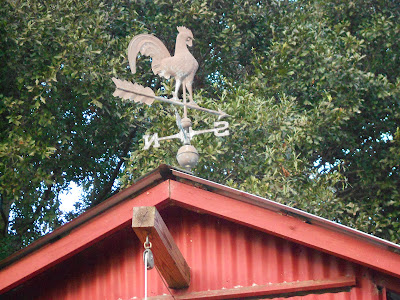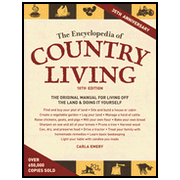There is an author that I really enjoy reading. His name is Wendell Berry and he's the author of a book called The Unsettling of America. He also wrote an essay entitled For the Love of the Land, that I'd like to share some excerpts from as it eloquently answers the question posed in today's posting: Why do we farm?
I've bolded excerpts from this essay and will make a few personal notes which I'll leave unbolded. Mr. Berry talks about good farmers who husband the land that they are blessed to possess. They are more like the Shepherds that Jesus talks about in the book of John, than the hirelings. A hireling works solely for compensation, whereas a Shepherd, or a Farmer in this instance, is personally vested and truly cares about the crops, animals, land and legacy he leaves behind:
Good farmers, who take seriously their duties as stewards of Creation and of their land's inheritors, contribute to the welfare of society in more ways than society usually acknowledges, or even knows. These farmers produce valuable goods, of course; but they also conserve soil, they conserve water, they conserve wildlife, they conserve open space, they conserve scenery.
All that is what farmers ought to do. But since our present society's first standard in all things is profit and it loves to dwell on "economic reality," I can't resist a glance at these good farmers in their economic circumstances, because these farmers will be poorly paid for the goods they produce, and for the services they render to conservation they will not be paid at all. Good farmers today may market products of high quality and perform well all the services I have listed, and still be unable to afford health insurance, and still find themselves mercilessly caricatured in the public media as rural simpletons, hicks, or rednecks. And then they hear the voices of the "economic realists": "Get big or get out. Sell out and go to town. Adapt or die." We have had 50 years of such realism in agriculture, and the result has been more and more large-scale monocultures and factory farms, with their ever larger social and ecological-and ultimately economic-costs.Why is it that hard-working farmers, must have off farm income in order to make ends meet? Thankfully, I see a growing demand for locally produced meats and vegetables in the rise in popularity of farmer's markets. We discussed in another post about a "factory egg" not being the same product as a pastured egg in terms of nutrients. The same can be said for produce and meat.
"Get big or get out" is so detrimental to the land, so detrimental to the farmer's family, and so detrimental to our future. This mentality forces the farmer to depend upon chemicals and GMOs and the jury is still out (for some) on the adverse effects of excessive chemical and genetic manuipulation has upon our health.
Why do good farmers farm well for poor pay and work as good stewards of nature for no pay, many of them, moreover, having no hope that their farms will be farmed by their children (for the reasons given) or that they will be farmed by anybody?
In the 1800's nearly 80% of the population was involved in agriculture. By the 1900's that percentage fell to 35%. In 2000 only 1.5% of the population was involved in agriculture. Those are stunning statistics. That is a very small percentage of people growing food, fiber and fuel for the world. Furthermore, 40% of the remaining farmers are 55 years old or older. I don't want to be an alarmist, but those figures don't bode well for the future.
In the 1800's most people were farmers or were very close to someone who was. If someone were to lose their "city job", they could fall back on farming. Today, not many people are involved in farming and don't have the land or skills to do it if they had to.
Well, I was raised by farmers, have farmed myself, and have in turn raised two farmers-which suggests to me that I may know something about farmers, and also that I don't know very much. But over the years I, along with a lot of other people, have wondered, Why do they do it? Why do farmers farm, given their economic adversities on top of the many frustrations and difficulties normal to farming? And always the answer is: Love. They must do it for love. Farmers farm for the love of farming. They love to watch and nurture the growth of plants. They love to live in the presence of animals. They love to work outdoors. They love the weather, maybe even when it is making them miserable. They love to live where they work and do work where they live. If the scale of their farming is small enough, they like to work in the company of their children and with the help of their children. They love the measure of independence that farm life can still provide. I have an idea that a lot of farmers have gone to a lot of trouble merely to be self-employed, to live at least a part of their lives without a boss.And there is the answer to the question posed in the title of today's post said more profoundly than I could ever hope to. Trying to add anything to Mr. Berry's answer is superfluous. I'll zip my lips.
And so the first thing farmers as conservationists must try to conserve is their love of farming and their love of independence. Of course they can conserve these things only by handing them down, by passing them on to their children, or to somebody's children. Perhaps the most urgent task for all of us who want to eat well and to keep eating is to encourage farm-raised children to take up farming. And we must recognize that this only can be done when the economics are fair. Farm children are not encouraged by watching their parents take their crops to market only to have them stolen at prices less than the cost of production.Ah, the love of farming and the love for independence. I can remember being a small boy and rushing outside after supper to plant my fruit cocktail!?! I can remember having toy tractors and combines and making "fields" in the backyard. I'd wait until my Dad came home from the farm and I'd empty out his rubber boots in order to get grains of rice to plant in my "fields." I remember my grandfather showing me how to garden and how I marveled at the miracle of how you plant this seed in the ground and a few days later, tiny green shoots would break the soil, face the sunlight and grow! I remember my other grandfather showing me how to compost. I've always loved the musty, rich smell of dirt being broken open and the sight of the sun either rising in the eastern sky or setting on the western horizon, the sounds of a rooster announcing a new day and a mama cow bellowing for her calf. How can one not love these things? A foreign concept to me.
Unfortunately, passing down the farm or the love of farming to the next generation is where the difficulty lies. For if it is your life's work and you wish to do it for any length of time, you must be compensated for it. So how do you accomplish this? How do farmers "set" a fair price? Commercial farmers really cannot set a price. They are at the mercy of the world market, government target prices, and/or subsidies which are pretty much out of the farmer's control. It's not an easy answer, and this is merely my opinion, but perhaps our entire paradigm of farming is wrong. Maybe we aren't supposed to be growing food for the world. Maybe we're supposed to be growing food for ourselves and our neighbors. Maybe our focus should be local.
Perhaps it starts with educating our friends and neighbors about what they are putting into their bodies. Mad Cow disease, e coli, etc. are exhibit A and B of what happens when large scale industrial farming goes wrong. For example, in the old days, when you bought milk or eggs or vegetables from Farmer Jones down the road, you knew him. Your kids went to school with his and you probably attended Sunday Service with him. You looked him in the eye and shook his hand. There is no way on God's green earth that Farmer Jones would sell you milk from a sick cow, or rotten eggs, or bad looking produce or meat from a sick animal. There was accountability. If Farmer Brown made you or your family sick, it would be a personal thing, for the consumer and producer were friends. Now, the milk from 10,000 cows is commingled. There is no face to face exchange. We're so distanced from our food that school children think their food comes from the grocery store. The only way to seemingly inject accountability is to put computer chips in cows and tracing the cow from the pasture to feedlot to factory to store to table. NO!
Maybe "progress" is to go backward and get to know your farmer. Buy directly from him or her. Be discerning about what you put in your body. Pay your farmer fairly for his or her products and don't compare the pricing to Wal Mart. Locally grown food is not the same as the factory food in the store. It's an apples to oranges comparison. Truth be told, regardless the price, a farmer will always farm. It is who he is and what he does. A farmer takes pride in sitting down to a suppertable with his family and looking down at a table filled with a bountiful harvest of produce, meat and milk that he raised on his land. A farmer also gets satisfaction in seeing someone else enjoying the product of his toils. If he has to get a "real job," he'll still farm nights and weekends, but largely he'll farm for the benefit of his family and a few neighbors.
But farmers are obviously responsible for conserving much more than agrarian skills and attitudes. I have already told why farmers should be, as much as any conservationist, conservers of the wildness of the world-and that is their inescapable dependence on nature. Good farmers, I believe, recognize a difference that is fundamental between what is natural and what is manmade. They know that if you treat a farm as a factory and living creatures as machines, or if you tolerate the idea of "engineering" organisms, then you are on your way to something destructive and, sooner or later, expensive. To treat creatures as machines is an error with large practical implications.We love our animals. We love the land. We love farming. Our labor is a labor of love. Get to know your local farmer. He loves what he does and loves to put good stuff on his table and YOURS!
 |
| Maggie Mae says to make the "moo've" to locally grown. |



















































